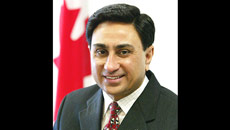Suzanne Anton was appointed as Minister of Justice and Attorney General in June 2013. In her current role, Anton is working towards protecting the public safety of British Columbians as well as ensuring that the justice system is transparent and judicious. In our meeting with Anton, she talked about her priorities as Justice and Attorney General and also shed light on the initiatives she intends to execute.
Can you tell us about your role as Minister of Justice and the Attorney General?
In BC we’ve already seen crime drop to its lowest rate in nearly four decades – but we’re not done. We will continue to take the proceeds of crime from criminals and give them back to victims and communities.We will act on the recommendations from the Missing Women Commission of Inquiry to help ensure something like that never happens again. Building on our recent MoU with the courts, we will continue to focus on increasing access to justice and working to clear the backlogs in our courts.
This year City of Surrey witnessed a surge in criminal activities. What steps are being taking to curb these activities?
In fact, Surrey RCMP has noted that violent crime has decreased by nearly one-third (31%) in the past eight years – and more recently, the City recorded one homicide in the first quarter of this year, compared to 11 in the first quarter of 2013.This first-quarter result coincided with the onset of Surrey’s High Risk Location (HRL) initiative, which the local RCMP is working to turn into a sustainable deployment model targeting locations that pose high risk to public safety. For our part, we have maintained close contact with Mayor Watts and Surrey RCMP, been supportive of the City’s dedicated task force, and are taking action to further public safety across the province through a multi-faceted approach. It’s worth noting, too, that since 2011/12, my ministry has provided over $470,000 from civil forfeiture to support crime prevention efforts in Surrey.
Youth crime is on the rise in cities across BC. How does the government aim to prevent the youth from indulging in criminal activities?
The Province funds more than 160 victim serviceprograms across BC that provide information, referrals, emotional support, safety planning, and practical assistance to victims of crime, including youth. Our Crime Victim Assistance Program provides financial assistance and benefits such as counselling to assist eligible victims and their families recover from the effects of violent crime. The Youth Against Violence Line is a 24/7, toll free province-wide help line that offers young people one-on-one support and information to
help them deal with issues of youth violence or crime. We are also incorporating youth gang prevention as we engage the public in developing BC’s Policing Plan. In March 2012, we invested $2.7 million of civil forfeiture proceeds into gang prevention and intervention programs targeted at high risk youth who are at risk of involvement in gang activity.
What is your biggest concern as Minister of Justice and Attorney General?
It is being able to successfully accomplish all of the important work that needs to be done in the areas I am responsible for as BC’s Attorney General and Minister of Justice. We take public safety and justice reform
very seriously and so we’re quite ambitious about the many ideas we have to further protect British Columbians and enhance their safety. In my recent mandate letter from Premier Christy Clark, there are 16 key priorities listed for the Ministry of Justice. I am amazed at how much has been achieved in the past year through the efforts of the entire ministry team, so I am confident we will be successful in achieving our goals in the year ahead.
What initiatives do you intend to execute in your term as Justice and Attorney General?
There are 16 key priorities that I will be focusing on as outlined in my mandate letter from the Premier. These include the implementation of the long term plan to improve courtroom capacity and access to justice in the Lower Fraser Valley, work with the Earthquake Review Board and present options on provincial earthquake preparedness, work with the Ministries of Children and Family Development and Aboriginal Relations and Reconciliation to develop and implement Violence Free BC and others.
In June, Vancouver witnessed two targeted shootings. Should the city be worried taking such incidents into account?
From a public safety perspective, any shooting is a concern. However, the latest available results from the Canadian Centre for Justice Statistics, from 2012 show BC’s homicide rate is at its lowest since records began more than half a century ago. BC’s rate is below the national average and lowest among the western provinces. The relatively high rate of gang-related homicides confirms that our government is on the right path, in continuing to invest in efforts to fight gang and organized crime. We dedicate $22 million a year to the anti-gang strategy and keeping dedicated anti-gang officers on the streets.
How will your past role as a prosecutor with the Criminal Justice Branch of BC be an asset to your current position?
The conflict resolution, issues management and analytical skills that a prosecutor must develop are useful in many other contexts. Personal experience has provided an appreciation for the importance of the criminal justice system to those who find themselves engaged in it, such as victims of crime, accused and witnesses. It’s also given me a personal understanding of the impact of crime on individuals and on the community as a whole.
What is the biggest challenge that the Ministry of Justice is facing right now?
It is the thought by some that the government can solve serious society problems on its own. While it is true that we have the ability to influence and improve many areas through policy, legislation, and program development, we need to work together as a society to really make significant change on a number of major fronts like domestic violence, road safety in the areas of drinking and driving and distracted driving and our very important goal of creating a Violence Free BC.
In what manner do you seek to overcome these challenges?
By maintaining a citizen-centred, fiscally responsible approach to justice and public safety. Our success will come through partnerships with community groups and police, public engagement, awareness campaigns, changes to regulations and legislation, and by sharing a common vision for this incredible province that we are fortunate enough to call home.
What would you describe as your biggest accomplishment in your current role?
We remain firmly committed to building a legacy of safety and security for women. Government committed to act quickly to modernize outdated liquor laws in the province and we are delivering on that promise. In April, we announced that family-friendly festivals can apply for full-site licensing, rather than having cordoned-off beer gardens.
Also, it was stated that happy hours and minimum pricing, as well as liquor sales at farmers’ markets are now permitted in BC. Also, liquor-primary establishments – like legions and pubs – can now apply to accommodate minors, up until as late as 10 p.m. We continue to make progress on the historic capital expansion plan for BC Corrections. The first phase was completed in February with
the opening of a new $185 million 216-cellexpansion wing at the Surrey Pretrial Services Centre and in May we broke ground on the construction of the centrepiece of the second phase of the plan, the $192.9 million Okanagan Correctional Centre.



